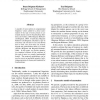Free Online Productivity Tools
i2Speak
i2Symbol
i2OCR
iTex2Img
iWeb2Print
iWeb2Shot
i2Type
iPdf2Split
iPdf2Merge
i2Bopomofo
i2Arabic
i2Style
i2Image
i2PDF
iLatex2Rtf
Sci2ools
NAACL
2010
2010
Some Empirical Evidence for Annotation Noise in a Benchmarked Dataset
A number of recent articles in computational linguistics venues called for a closer examination of the type of noise present in annotated datasets used for benchmarking (Reidsma and Carletta, 2008; Beigman Klebanov and Beigman, 2009). In particular, Beigman Klebanov and Beigman articulated a type of noise they call annotation noise and showed that in worst case such noise can severely degrade the generalization ability of a linear classifer (Beigman and Beigman Klebanov, 2009). In this paper, we provide quantitative empirical evidence for the existence of this type of noise in a recently benchmarked dataset. The proposed methodology can be used to zero in on unreliable instances, facilitating generation of cleaner gold standards for benchmarking.
Beigman Klebanov | Computational Linguistics | Computational Linguistics Venues | NAACL 2010 | Quantitative Empirical Evidence |
| Added | 14 Feb 2011 |
| Updated | 14 Feb 2011 |
| Type | Journal |
| Year | 2010 |
| Where | NAACL |
| Authors | Beata Beigman Klebanov, Eyal Beigman |
Comments (0)

